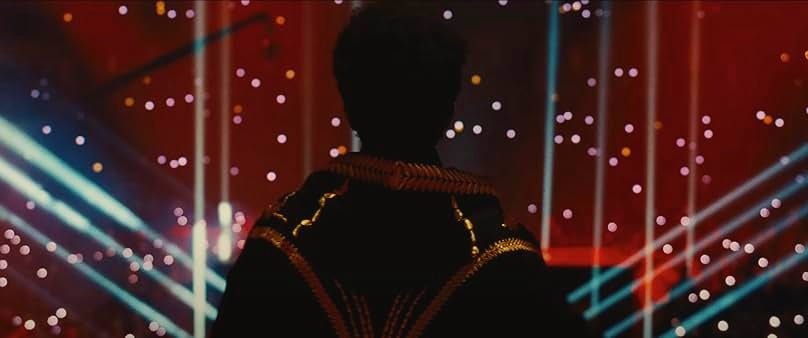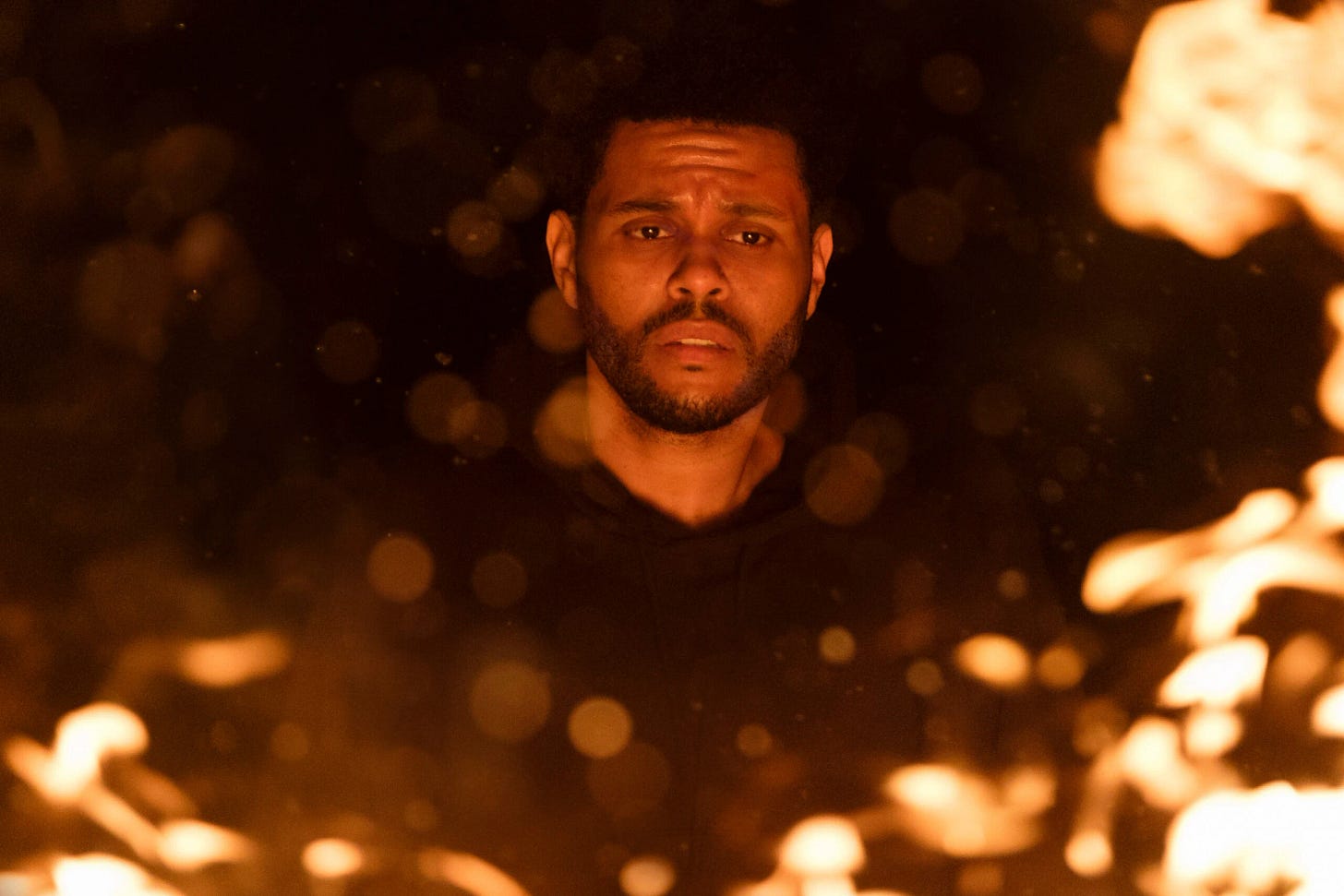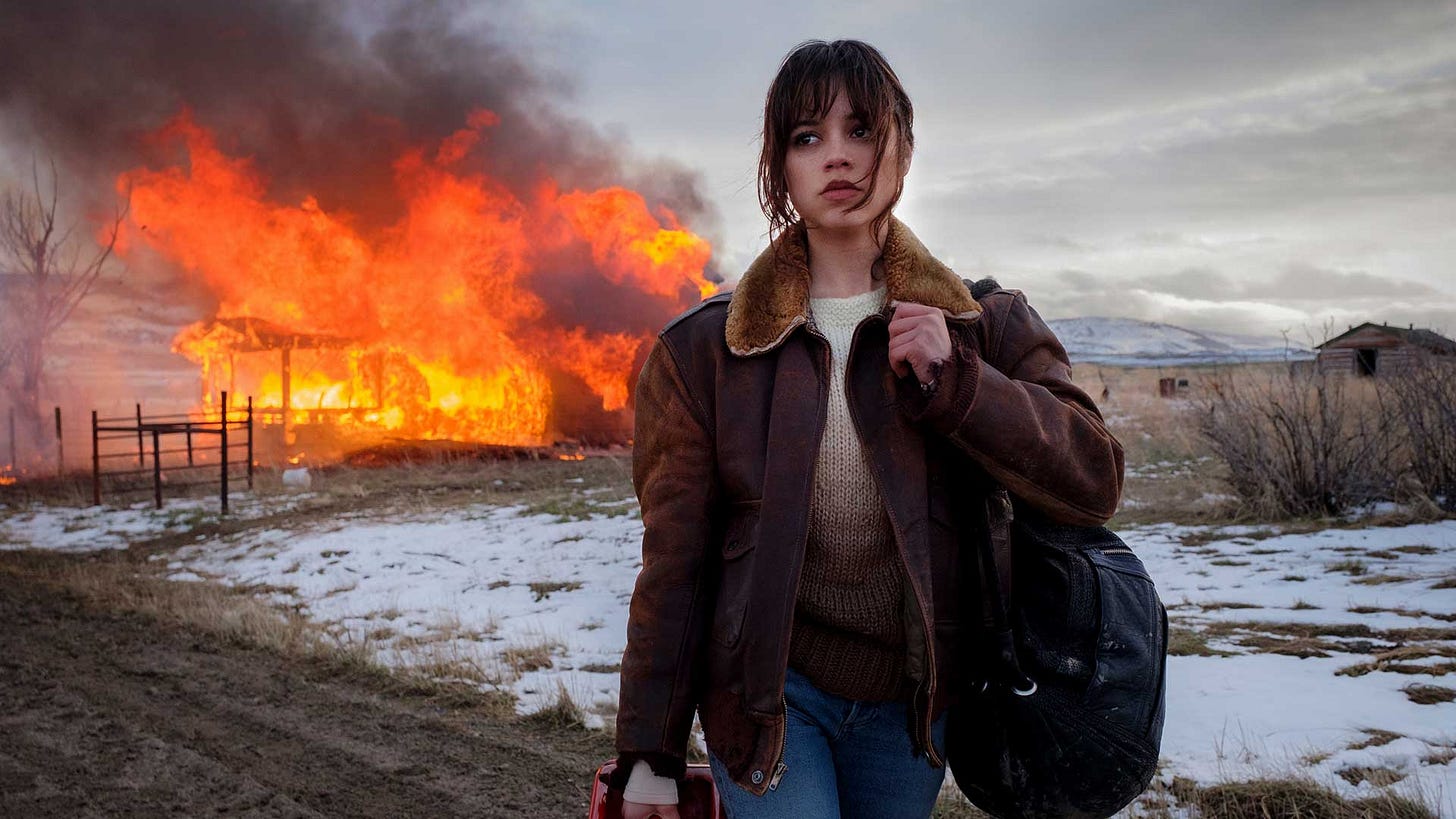Hurry Up Tomorrow: Or How I Learned to Stop Worrying and Love Vanity
You're forcing me to be bad right now.
Guess what I saw last weekend. The Weeknd. Based on Abel Tesfaye’s album from this year of the same name, the film version, directed by Trey Edward Shults, fictionalizes Tesfaye as an insomniac musician on the verge of a mental breakdown. As someone who doesn’t listen to rap, R&B, or most modern American music, all I knew about The Weeknd was that he walked around in that dollhouse the last time Tom Brady won a Super Bowl. But with stars like Jenna Ortega and Barry Keoghan accompanying the artist alongside up-and-comer Trey Edward Shults, Hurry Up Tomorrow seems to break the mold of artistic promotion. Or so it seemed. Relentlessly mocked and trashed online, Hurry Up Tomorrow has been accused of many things: vain, pretentious, empty, awful. Are all those things true? Or is this film being railroaded?
What’s it all about?
The film follows global music star The Weeknd (Abel Tesfaye) as he grapples with the emotional fallout of a recent breakup while preparing for a major concert tour. Under pressure from his manager, Lee (Barry Keoghan), Abel pushes through a show despite being diagnosed with muscle tension dysphonia hours before. Meanwhile, a troubled fan obsessively drawn to Abel, named Anima (Jenna Ortega), burns down her house and makes her way to his next performance. After Abel loses his voice mid-show and storms offstage, Anima infiltrates the venue where the two then spend a surreal night together. But when Anima’s instability surfaces, she traps Abel in a hotel room, forcing him to confront the emotional truths embedded in his music.
Glorified Ad?
I did listen to the album before watching the film. Safe to say, it didn’t help me understand the film any more. But, just chop it up to my music taste. As a listener, I do connect with the nonverbal rather than the verbal, so I can’t fully appreciate musicians as auteurs in the same way I do filmmakers. Thus, I am way behind on all The Weeknd lore. So, how does the album and the film work in conjunction? No clue. But there’s still something undeniably authentic and raw about this project. Critics have accused Hurry Up Tomorrow of lacking depth and merely being a promotional tool for Abel’s latest album. Is there some truth to it? Yes. But from listening to his album and watching the picture, I get a basic sense of his obsessions. Familial abandonment, toxic female codependency, fame, self-destruction, and whatnot. While these may largely be first-world, celebrity musings, they don’t lose their vulnerability in the process.
The Weeknd’s Riddle
The film is so preoccupied with the process and artistic construction of The Weeknd’s persona that it plays like a 2020s version of 8 ½. So, to circle back to accusations of emptiness, there’s certainly something muddy about how each idea comes together. Nevertheless, it’s disingenuous for critics to avoid delving into who Abel is as an artist before labeling the film as meaningless. At the very least, I can admit, I don’t know. Whether Abel is important enough of an artist to be worthy of this exploration is a separate discussion, but to outright dismiss without either analysis or admission of unawareness is downright insincere. Usually, I can’t stand it when films prioritize loose ideas above characters and meaningful storytelling. But, you’re never bashed over the head with self-importance; instead, either you understand the depths the creators are mining for or are left with questions and unexplained feelings. I don’t believe that this is a film attempting to be “deeper” than it is. Rather, it’s a film that encourages the audience to explore the film like a riddle, trying to discover what Abel is trying to say. This ambiguous storytelling style never grates or frustrates. Schults and Abel offer no obvious explanations for the many motives and plot points, where the audience is honored for their intelligence and critical thinking, rather than throwing the bookshelf at them. Abel’s clearly trying to destroy the image of The Weeknd to evolve artistically through the film to start anew. To do this, Abel and Schults understood that traditional narrative would burden such an exploration. Not everything needs to be neatly tied into a bow. Thankfully, Schultz’s cinematic prowess keeps the film deeply engaging.
Pure Cinema
Hurry Up Tomorrow is an audiovisual experience. Granted, every film is, but Hurry Up Tomorrow takes it to another level. This film makes no qualms about prioritizing atmosphere and the surreal over traditional narrative. From the opening performance of Wake Me Up, you could tell you’re in for a dazzling treat. Schults envelops us in Abel’s hurried, frenzied mindset, oscillating between frenetic actions and operatic long takes. While the color and photography pop, it's the sound design and music that so perfectly complement the imagery. It feels as if you're sitting in the middle of a concert. Once the film ventures into the surreal to explore Abel’s psyche, it delivers some of its most unsettling and abstract moments of the film. Schults and Abel (a vocal fan of David Lynch) evoke the mood and unpredictability reminiscent of his work. Unlike Lynch, I find that most filmmakers are afraid to truly explore the marriage of sound and image in an experimental or meaningful way, where every picture seems to extract the bare minimum from cinema’s potential. It’s precisely what makes cinema different from every other art form that Hurry Up Tomorrow attempts to maximize, even if it can’t fully capitalize on its core message.
“I’m getting calls right now 💅🏾”
The majority of the internet trolling has been targeted against the film’s acting, which is somewhat unwarranted. Of course, all of it directed at none other than Abel himself. While his dialogue delivery leaves much to be desired, there’s a kind of frankness from the unemotiveness that comes off as awkward, but not totally out of line with the film’s tone. In one scene, where he tells off Jenna Ortega’s character who insists on joining him on tour, it’s funny, and the film doesn’t mind that you laugh. Outside of that, though, I’d say he understands the nuances of visual acting, controlling his eyes and facial features to subtly reveal turmoil instead of spinning around like a ball. He’s clearly shown improvement from The Idol, which is more than you can ask for from a professional musician. Ortega is also wonderful. I’ve always enjoyed her screen presence, and it’s no different here. Some claim her performance stands out only in comparison to Abel, but her vibrant, manic energy works wonders here. Then, there’s Barry Keoghan, who’s good in anything. Truly one of the best up-and-comers working. Just watch The Banshees of Inisherin if you’re not sure.
Cowards at heart
Hurry Up Tomorrow is far from a perfect movie, and perhaps it’s not really a movie to begin with. I don’t know, and I don’t care, because I respect the effort. The people trying to dunk on this movie are cowards at heart. They can’t stand the thought of somebody being true to themselves and putting it all out on the line artistically. It might be extreme to say, but there’s an ugly, mean-spirited streak in the critical reception—one that seems to denigrate the artistic creativity and vulnerability that artists possess and critics often lack. At the same time, critics seem to be angry that they’re being “sold” The Weeknd’s music. What the hell did they expect? It’s a film adaptation of an album. It’s complimentary. God forbid, the music and the performer take center stage. But, when a mega corporation like Hasbro sells their toys through a film, we’re all supposed to eat it up because of a few semi-topical, feminist diatribes. Unlike that film, Abel actually took an artistic risk. Nobody asked him to do it, yet he did it for the sake of it. How are we supposed to foster an environment where artists feel free to create and be vulnerable if we shoot down attempts at honesty with vitriol and daggers? I’d rather pictures throw everything against the wall in an earnest attempt to achieve artistic significance than play it safe. So what if it’s pretentious? That’s the risk you take when you have a vision you care about. With all its imperfections, Hurry Up Tomorrow is a film with a strong spirit. And that’s more than most films can say.










this was a great review, enjoyed every word.